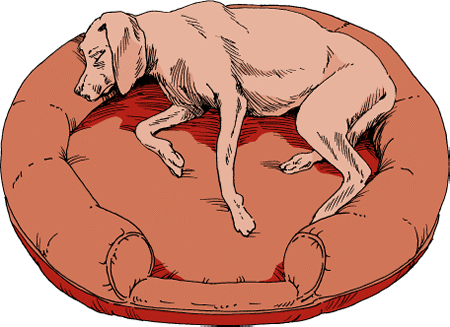Pet ownership carries responsibilities that should not be taken lightly. Pets are family members that need to be cared for throughout their entire lives, not disposable possessions that can be discarded if they become inconvenient. Pets also carry financial responsibilities for housing, a quality diet, and veterinary care. The latter includes routine veterinary examinations, preventive vaccinations, parasite control including heartworm prevention, treatment during an illness or emergency, dental cleanings, and so forth.
The money and time devoted to pet care are substantial, but the rewards are much greater. Research has shown that the bond that can develop between people and animals as a result of owning and caring for a pet has significant social and health benefits see also Health and the Human-Animal Bond. Dogs provide companionship, a sense of purpose, and unconditional love. These qualities can especially benefit lonely, elderly, or mentally disturbed people. Research has also shown that pet ownership can prolong both length and quality of life by reducing stress, blood pressure, anxiety, and depression. Under proper supervision, pet ownership also teaches children about responsibility, caring, and commitment.
Dog bed

|
Housing
Indoor dogs share the roof over our heads and, sometimes, our furniture as well. Puppies, and some mature dogs as well, benefit from having a crate, which can help greatly in housetraining and other training. Many dogs also feel secure in a crate because it is their own space, or “den.” You may also want to provide a comfortable dog bed for your pet. In addition, your dog should have a designated, quiet place where food and water bowls are placed.
Special Needs of Outdoor Dogs
Hunting and guard dogs are often kept outdoors year round. These dogs have special needs that relate primarily to shelter, nutrition, and companionship. In addition, it is important to remember that dogs are social animals that do not like to be by themselves or kept in isolation. Outside dogs need frequent attention and human contact for health, happiness, and prevention of behavioral problems.
Diet
Proper nutrition is an important and often overlooked aspect of pet ownership. The pet food industry is large, offering many choices, and all dog foods are not of equal quality. Name-brand dog foods are backed by scientific research and quality control to provide complete, balanced nutrition for your pet. Dry food is generally preferable to canned because it promotes healthy teeth and gums (while providing the same nutrition). Diets that are specifically formulated for the various stages of a dog’s life (including puppy, adult, and senior) are widely available in grocery stores, pet shops, and other outlets such as pet “superstores.” Specialty diets for specific problems (such as obesity, food allergy, or kidney disease) have also been developed; many of these diets are prescription diets that are available only through veterinarians.
Most adult dogs are fed 1 to 2 times daily, although puppies require more frequent feeding see Diet. Large-breed dogs should be fed at least twice a day to prevent eating large amounts that can lead to bloat. Your veterinarian can help you estimate your dog’s daily caloric needs, which can then be provided in multiple feedings of equal size. Meals should be provided in a quiet corner, away from the hustle and bustle of family life. This fosters proper digestion and avoids gorging and possessive aggression.
One of the biggest problems in pets is overfeeding, which can lead to obesity, other serious diseases (such as heart disease and arthritis), and a shortened life span. Only the proper amounts of a quality dog food should be fed. Table food should not be fed or should be minimized; it should never exceed 10% of your dog’s daily caloric requirements. Your veterinarian can provide an estimate of the proper type and amount of food for your dog to maintain your dog’s ideal weight. As a general rule, a dog is at proper weight when the ribs and spinal vertebrae (backbones) can be felt, with only a small amount of underlying fat and other body tissues.
Fresh, clean water should always be available to your dog. Never restrict access to water unless instructed by your veterinarian.
Exercise
Dogs need regular exercise. Sedentary dogs tend to gain weight and are prone to both medical and behavioral problems. Dogs that get enough exercise have improved muscle tone, metabolism, weight control, and temperature regulation. However, overly strenuous exercise can also cause problems, especially in dogs that are out of shape, very young, or very old. Human athletes should keep this in mind before taking their dogs on long, strenuous runs, especially in hot or humid weather.
Temperament
Dogs are pack animals that bond closely to people, making them excellent family pets. They are very social by nature and need attention from their human companions. Bored or lonely dogs often develop behavioral problems, such as destruction of property or even self-mutilation, as an outlet for loneliness and anxiety. Certainly, some breeds of dogs, such as Irish Setters, Dalmatians, and terriers in general, tend to be more energetic and high-strung than other mellower breeds, such as Newfoundlands or Bassett Hounds. These more energetic dogs tend to have a greater need for human companionship and may be more likely to develop problems, even if left for only short periods. Temperament also needs to be considered if there are small children or other dogs or pets in the household.
This article is written by
John A. Bukowski , DVM, MPH, PhD;
Susan Aiello , DVM, ELS
